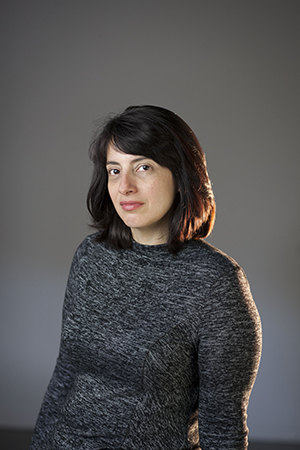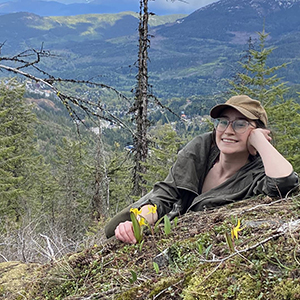A Necessary Story: Carlee Bouillon in Conversation with Rebecca Păpucaru

Malahat Review volunteer and recent contributor Carlee Bouillon talks with Rebecca Păpucaru, one of two judges for our 2022 Novella Prize contest. They discuss authenticity, altering real events in service of a story, and the feeling that a writer has arrived at their point in their novella.
Rebecca Păpucaru's short story “Yentas” won The Malahat Review's 2020 Novella Prize and was the editors’ selection for the 2021 National Magazine Awards. Short fiction has appeared in Grain and EVENT, and has been shortlisted for the Penguin Random House Canada Student Award for Fiction. Her first book, The Panic Room (Nightwood Editions) was awarded the 2018 Canadian Jewish Literary Award for Poetry and was also a finalist for the A.M. Klein Prize for Poetry and longlisted for the Gerald Lampert Memorial Award. She is this close to completing her first collection of short fiction, and is currently seeking a forever home for her first novel, As Good a Place as Any.
Everyone has a slightly different idea of what makes a good story into a story you can’t forget—that’s what makes writers unique to each other. So what are you looking for in a winning entry? Is there anything in particular that you are hoping to see?
I want a story to feel authentic, even if it's pure fantasy. I want it to feel necessary, as if it had to be told, but that doesn’t mean the subject has to be earth-shattering. I want to feel I'm in the hands of a writer who understands the novella form, the chance it offers to explore a character in depth. Ultimately, I want, as Nabokov said, to feel that the writer has arrived at their point, “by diminishing large things and enlarging small ones.”
You were the winner of the 2020 Novella Prize, and now you’re a judge! How do you feel about this role change?
I've been teaching my college students Gwendolyn MacEwan's poem, “Memoirs of a Mad Cook,” which is about the intimacy of cooking and how nourishing others is often a presumptive act; at one point the speaker asks, “maybe I'm handling a tomato wrong, / how can I know if I'm handling a tomato wrong?”
These entries are my tomatoes, and I’m humbled and honoured to be handling them. Unforgivable pun but—I’m eager to learn how the competition sausage is made: how entries are whittled down, debated, and finally, decided. I'm hoping I’ll become as equanimous as possible about contests, to accept that not making the cut (more food metaphors, sorry) maybe isn’t some final judgement on my work but just the way (please, somebody stop me) the contest cookie crumbles.
You are both a poet and a fiction writer. Is one of these genres your home, as a writer? Your go-to? Are you ever inclined to mix these genres? Does one genre inform the other, for you? Which of them came first?
Poetry came first, but my poetry tends to be narrative - there's usually a story—so prose feels natural, too. I don’t have a go-to, but I can’t switch between the two, and I don’t mix, either. Sometimes, though, a bit of poetry enters my prose—I might invent a word or drop a hit of assonance, which always pleases me, so long as it doesn’t distract from the narrative.
In your interview with All Lit Up, you describe how much of your book The Panic Room represents your own lived experiences. In your interview with TMR about your winning novella “Yentas” last year, you say that to write this story you “piec[ed] together then alter[ed] memories.” How much of your writing is based on or inspired by the real people and experiences in your life? Do you feel the need to alter details, or conversely, stay as true as possible? How do you make these decisions?
A lot of my writing is based on real people and events, but I alter a lot, too, in service of the story. Sometimes the people and events are close, as in “Yentas,” but I definitely strayed far from actual events (I have never been possessed by a dybbuk, nor has anyone I have ever known). Sometimes I barely know the person or people that inspired me. One story, “Unbecoming,” (forthcoming in EVENT) is about a middle-aged woman who, as a child in the 1950s, acted in her father’s educational filmstrips. The only “real” experience this draws on was a screening I attended years ago, of these unintentionally hilarious shorts; one featured a little girl running maniacally with scissors, then falling on them with gory results. The moderator explained that the little girl was the director’s daughter, and so, long years later, I wondered what that might mean for a parent to have their child enact the sort of gruesome, accidental deaths that parents fear most, over and over again for their camera? I wrote the story to explore that and then, as usual, other ideas presented themselves as I wrote.
What is your reading life like? Do you consume similar amounts of poetry and fiction? What have you read lately that has challenged or inspired you?
I read prose when writing prose, poetry when writing poetry, and nonfiction in between. I like randomness to be part of my reading—I think Amazon and algorithms keep people in book bubbles. A church in our neighbourhood has an annual book sale where you can fill a box for five dollars, and I usually pick up books I might not otherwise. I’m currently reading The World According to Garp, one of my church finds, and The Courage to Be by Paul Tillich. Lately, though, I’ve been reading and writing short fiction (I’m revising the last story in my first collection), and I’ve been inspired by Nina Berberova’s The Tattered Cloak and Mavis Gallant’s The Selected Stories.

Carlee Bouillon
* * * * * * * *









